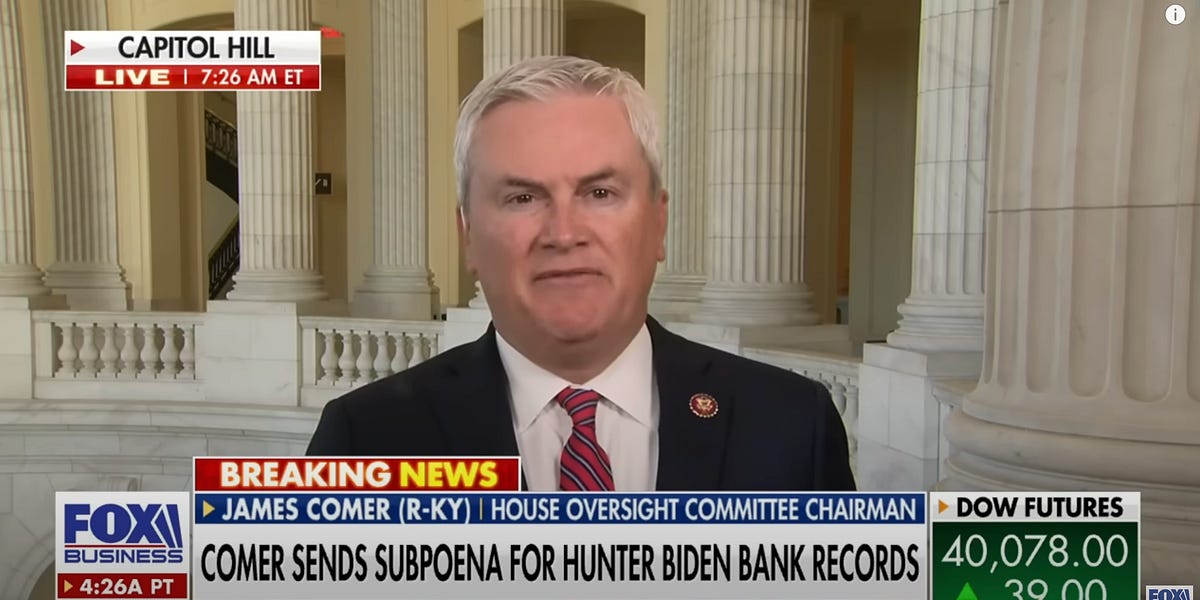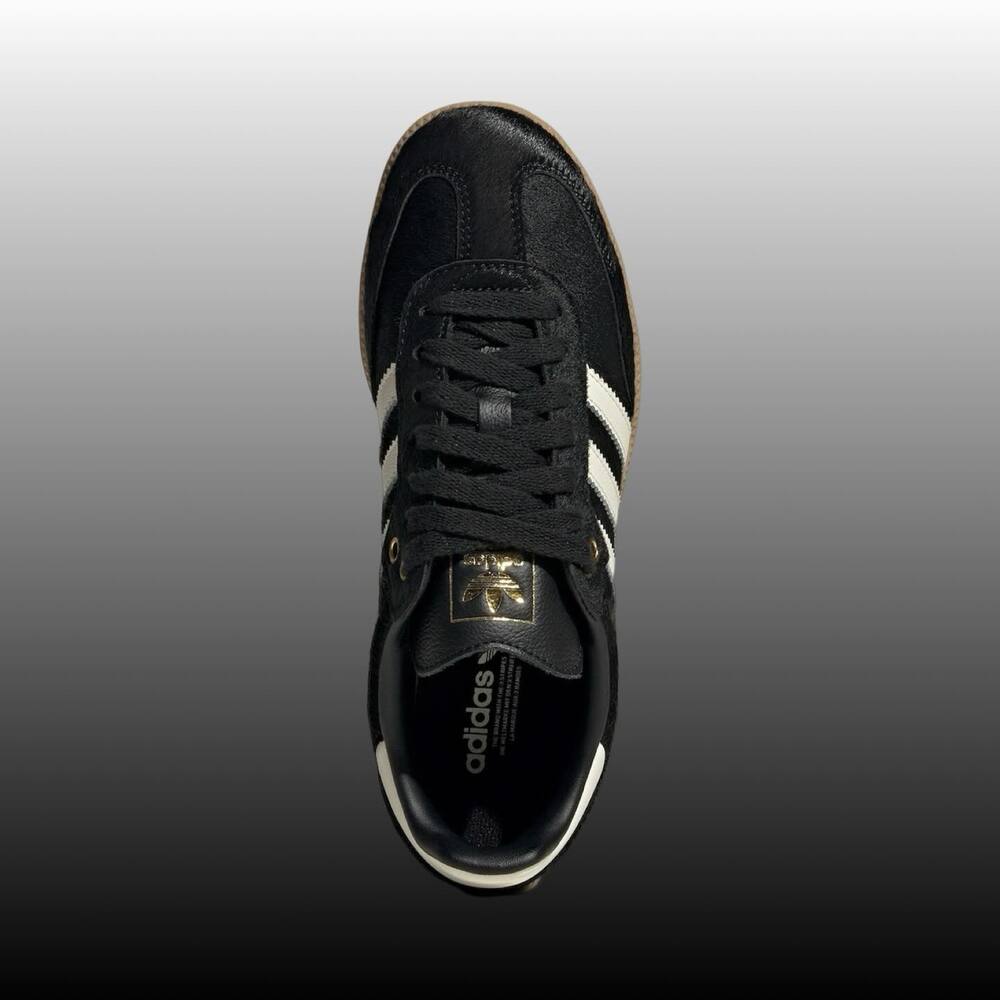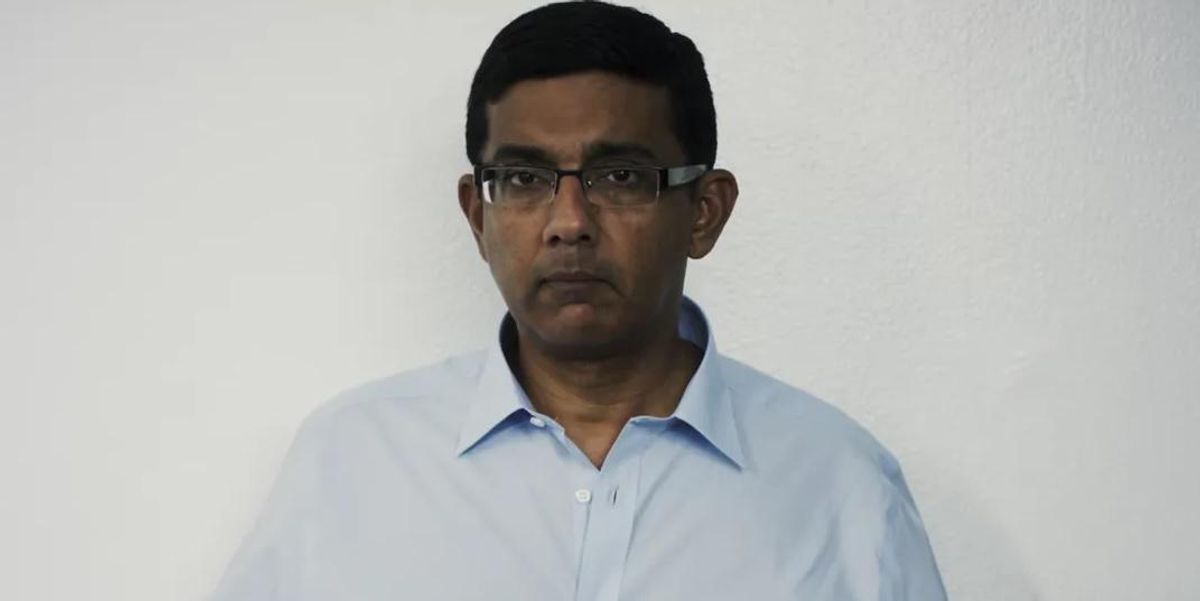Poor Dinesh D’Souza can’t seem to get a break, apart from his pardon from Donald Trump, his constant appearances in rightwing media, and all the money he gets from adoring low-information fans. His latest documentary-shaped object, 2000 Mules, alleges there’s evidence off rampant voting fraud in the 2020 election. But it’s being ignored by Tucker Carlson and even Newsmax, and there’s practically nothing too stupid or crazy for Newsmax.
Read More: No One Taking Dinesh D’Souza’s Documentary Seriously, Except Other People Who Also Make Things Up
And now some snotty liberal fact checkers at NPR have confirmed that one of its central claims is just plain false. In the film, the bogus “election integrity” group True the Vote claims it used cellphone tracking data to prove massive voter fraud; to show just how reliable its methods are, the group claimed its data analysis even helped solve a MURDER that had police baffled.
But as NPR explains, hahaha LOL LMAO True the Vote didn’t solve dick. (Slight paraphrase of NPR.) Also, have we mentioned D’Souza was himself convicted of election fraud? But he was pardoned, so now he’s blameless.
The claim was so impressive that Donald Trump spokesperson Liz Harrington gushed that True the Vote
“solved a murder of a young little girl in Atlanta. I mean, they are heroes.” Fans of the film have echoed that message on social media.
Unfortunately, that’s a load of codswallop:
Authorities in Georgia arrested and secured indictments against two suspects in the murder of Secoriea Turner in August 2021.
In response to NPR’s inquiries, True The Vote acknowledged it had contacted law enforcement more than two months later, meaning it played no role in those arrests or indictments.
That’s not just NPR proving the claim is false; that’s True the Vote admitting it didn’t solve, as we say, dick.
Phone-y Business
The movie purports that True The Vote proved a massive vote fraud effort by analyzing a shitload of phone geolocation data purchased from companies what track location information from phones and other mobile devices. Supposedly, the data identifies around 2,000 people who made at least 10 visits each to absentee ballot drop boxes, many of them located in different parts of cities, as well as to a number of nonprofit groups. They’re the “mules” of the title, because mail-in voting is just like drug dealing! (Yes, the movie refers to “ballot trafficking” and calls the nonprofits “stash houses,” because of course it does. These may be terms Dinesh learned in prison.)
The phone data supposedly “proves” the nonprofit groups were paying people to pick up ballots and to stuff the drop boxes! But as fact checks by the AP, and by Politifact, and by the Washington Post have all pointed out, the tracking data can only indicate a general location. It isn’t anywhere near granular enough to prove even that someone was standing next to a drop box, much less that they put ballots (legally or illegally) inside. And since elections authorities put drop boxes in places people are likely to find convenient, there are plenty of reasons one person might have been near those locations at various different times without going up to a ballot drop box. (In Atlanta, for instance, 28 of Fulton County’s 36 drop boxes were at public libraries.)
Murder, They Vote
Now, back to the murder claim. In the movie, True the Vote’s executive director Catherine Engelbrecht and board member Gregg Phillips (who also have executive producer credits on the film) claim their analysis was so good it helped solved not one but two murders, both of which were “ebbing on cold case status.” But they only talk about one, the killing of eight-year-old Secoriea Turner in Atlanta on July 4, 2020.
Phillips says he and his team obtained device data from the area of the shooting, which showed “only a handful of unique devices that could have pulled the trigger…each of these devices has a unique device ID, and we turned the bulk of this information over to the Federal Bureau of Investigation.”
“Now, I read they’ve arrested two suspects,” D’Souza responds to Phillips.
“They have,” Phillips says.
Also too, on a podcast flogging the film, D’Souza made an even more specific claim, that True The Vote gave its data to the FBI, and that the feds passed on the data to the Georgia Bureau of Investigation.
“Shortly after that,” D’Souza said, “boom” – there were two arrests and indictments.
NPR contacted the GBI to fact-check this claim.
“The GBI did not receive information from True the Vote that connected to the Secoriea Turner investigation,” said Nelly Miles, the GBI’s Director of the Office of Public and Governmental Affairs.
Aha. Neither Engelbrecht nor Phillips would give NPR an interview, but Engelbrecht did send an email saying that she
“called a contact at the FBI” and Phillips gave him the information about the Turner case “on or about October 25, 2021.”
That would have been about two months after both suspects had already been indicted, on August 13. And contrary to Engelbrecht’s assertion that the case was nearly “cold,” police had arrested one of the two suspects within two weeks of the murder. Indeed, he turned himself in. The second suspect was arrested in early August. As WaPo’s Philip Bump points out, “There is no indication that geolocation data played a role in either arrest, much less data provided by Phillips’s team.”
So nope, True the Vote didn’t solve dick. Like, maybe its data did include the two suspects’ phones? But by the time that analysis was done, the alleged killers’ names were already in the news for a couple months. Oh look, you found their phones somehow.
Antifa Super Soldier Vote Mules!!!@!
NPR points out other problems with the movie’s assertions, debunking a claim D’Souza made in an interview that the phone data also matched up with another organization’s data, to prove that some of the “mules” had also been Antifa rioters!!!!!
“There is an international organization called ACLED [Armed Conflict Location & Event Data Project] that monitors the cell phones of all violent rioters around the world,” D’Souza said on the Dan Bongino Show. “What True The Vote did was they took the cell phone data on the mules and matched it against the ACLED data on the rioters. And guess what? There’s a pretty big overlap.”
In the film, Phillips also cites ACLED, which is a nonprofit research organization.
“There’s an organization that tracks the device IDs across all violent protests around the world. We took a look at our 242 mules in Atlanta and, sure enough, dozens and dozens and dozens of our mules show up on the ACLED databases,” Phillips says in the film. “This is not grandma out walking her dog, these are, you know, violent criminals sometimes.”
First of all, that Dinesh D’Souza quote right there — “There is an international organization called ACLED [Armed Conflict Location & Event Data Project] that monitors the cell phones of all violent rioters around the world” — can only be spoken by someone utterly confident that their target audience is absolutely fucking clueless about how everything in the entire works.
Even so, Sam Jones, a spox for ACLED, said both claims were “categorically false,” and that it’s “highly unlikely that these conclusions have any basis in fact.” ACLED’s director of research and innovation, Roudabeh Kishi, noted that the company “does not track device ID” at all.
And while ACLED does track riots and other violent incidents, plus peaceful protests,
Their data do not include specific locations inside a city – such as neighborhoods or city blocks – where protests took place. ACLED does not track the time of day of those incidents or generally note individual participants, except for high-profile leaders.
Kishi said nobody from the film had contacted the company at all.
Engelbrecht had an explanation, though! When Phillips said, “There’s an organization that tracks the device IDs across all violent protests,” he didn’t mean ACLED, although she wouldn’t identify where the supposed data proving “mules” had also been rioting came from. As for D’Souza’s statement that the data came from ACLED, she wrote, “If you have questions about Dinesh’s comments, my suggestion would be to ask Dinesh.” Conveniently, D’Souza didn’t respond to NPR’s interview requests.
Dinesh Explains It (Not At) All
Now, we should at least note that D’Souza, grumpified by an earlier article Philip Bump wrote about the problems with trying to use phone data to prove “ballot trafficking,” did sit down for an interview with Bump to explain why, logically, the movie’s conclusions are 100 percent true. As Bump puts it, the takeaway is that the hourlong interview “can be summarized fairly succinctly: D’Souza admits his movie does not show evidence to prove his claims about ballots being collected and submitted.”
D’Souza can’t even prove that the “whistleblower” the movie claims blew the lid off the fraud scheme even exists. He never met the guy, who wanted to remain anonymous.
But he frequently tells Bump it’s really unfair and illogical to demand he provide evidence that any of the “mules” the movie talks about submitted even a single illegal ballot, so that’s amusing. He also accuses Bump of “armchair theorizing” about his great big MAGA fanfiction of a movie.
Read it only if you want to burn one of your free WaPo reads this month; it’s not worth using one of my “gift” linkies for.
Yr Wonkette is funded entirely by reader donations. If you can, please give $6 or $11 a month so we can keep you up to date on all the bullshit out there. My there’s a lot.








































































